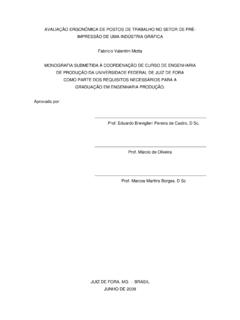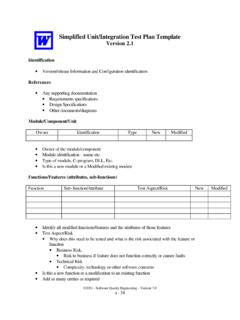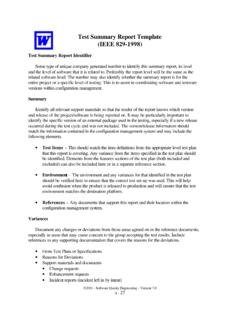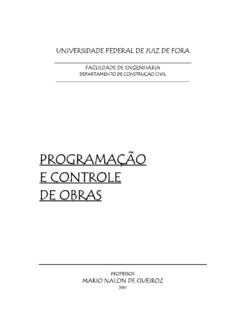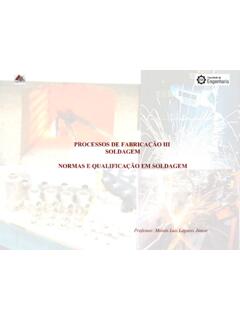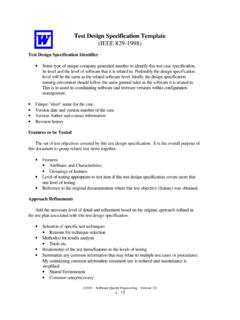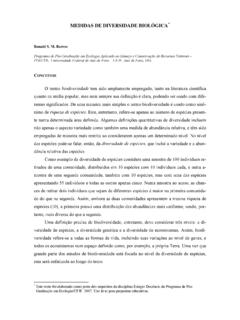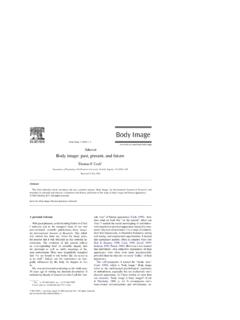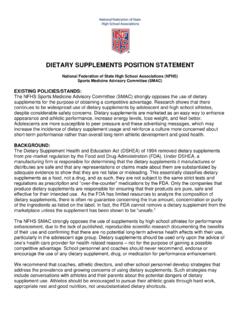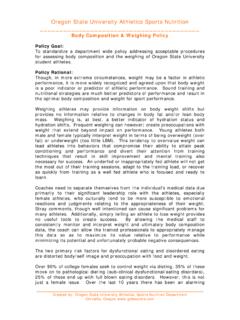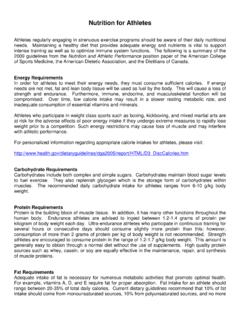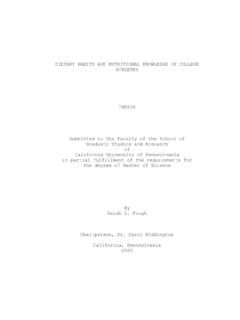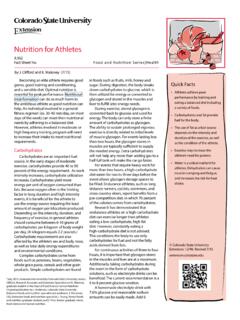Transcription of MEDICINE, Nutrition and Athletic Performance - UFJF
1 AMERICAN COLLEGEof SPORTS MEDICINE, AMERICAN DIETETIC ASSOCIATIONDIETITIANS OF CANADAN utrition and AthleticPerformanceJOINT POSITION STATEMENTABSTRACTIt is the position of the American Dietetic Association, Dietitians of Canada,and the American College of Sports Medicine that physical activity, athleticperformance, and recovery from exercise are enhanced by optimal organizations recommend appropriate selection of foods and fluids,timing of intake, and supplement choices for optimal health and exerciseperformance. This updated position paper couples a rigorous, systematic,evidence-based analysis of Nutrition and Performance -specific literature withcurrent scientific data related to energy needs, assessment of bodycomposition, strategies for weight change, nutrient and fluid needs, specialnutrient needs during training and competition, the use of supplements andergogenic aids, Nutrition recommendations for vegetarian athletes, and theroles and responsibilities of the sports dietitian.
2 Energy and macronutrientneeds, especially carbohydrate and protein, must be met during times of highphysical activity to maintain body weight, replenish glycogen stores, andprovide adequate protein to build and repair tissue. Fat intake should besufficient to provide the essential fatty acids and fat-soluble vitamins and energy for weight maintenance. Although exercise performancecan be affected by body weight and composition, these physical measuresshould not be a criterion for sports Performance and daily weigh-ins arediscouraged. Adequate food and fluid should be consumed before, during,and after exercise to help maintain blood glucose concentration duringexercise, maximize exercise Performance , and improve recovery time.
3 Athletesshould be well hydrated before exercise and drink enough fluid during andafter exercise to balance fluid losses. Sports beverages containing carbohy-drates and electrolytes may be consumed before, during, and after exercise tohelp maintain blood glucose concentration, provide fuel for muscles, anddecrease risk of dehydration and hyponatremia. Vitamin and mineral supple-ments are not needed if adequate energy to maintain body weight is consumedfrom a variety of foods. However, athletes who restrict energy intake, usesevere weight-loss practices, eliminate one or more food groups from theirdiet, or consume unbalanced diets with low micronutrient density may requiresupplements. Because regulations specific to nutritional ergogenic aids arepoorly enforced, they should be used with caution and only after carefulproduct evaluation for safety, efficacy, potency, and legality.
4 A qualified sportsdietitian and, in particular, the Board Certified Specialist in Sports Dietetics inThis joint position statement is authored by the American DieteticAssociation (ADA), Dietitians of Canada (DC), and American College ofSports Medicine (ACSM). The content appears in ADA style. This paper isbeing published concurrently in Medicine & Science in Sports & Exercise and in the Journal of the Aminerican Dietetic Association, and the CanadianJournal of Dietetic Practice and Research. Individual name recognition isreflected in the acknowledgments at the end of the & SCIENCE IN SPORTS & EXERCISE Copyright 2009 by the American College of Sports Medicine, AmericanDietetic Association, and Dietitians of.
5 United States, should provide individualized Nutrition direction and adviceafter a comprehensive Nutrition STATEMENTIt is the position of the American Dietetic Association,Dietitians of Canada, and the American College of SportsMedicine that physical activity, Athletic Performance , andrecovery fi-om exercise are enhanced by optimal organizations recommend appropriate selection , timing of intake, and supplement choicesfor optimal health and exercise ADA position paper uses ADA's Evidence AnalysisProcess and information from the ADA Evidence AnalysisLibrary (EAL). Similar information is also available fromDC's Practice-based Evidence in Nutrition (PEN). The useof an evidence-based approach provides important addedbenefits to earlier review methods.
6 The major advantage ofthe approach is the more rigorous standardization of reviewcriteria, which minimizes the likelihood of reviewer biasand increases the ease with which disparate articles may becompared. For a detailed description of the methods used inthe evidence analysis process, access the ADA's EvidenceAnalysis Process at Statements are assigned a grade by an expertwork group based on the systematic analysis and evaluationof the supporting research evidence: grade I = good, gradeII = fair, grade III = limited, grade IV = expert opinion only,and grade V = a grade is not assignable because there is noevidence to support or refute the infon-nation for this and other topicscan be found at and and subscriptions for non-ADAmembers are purchasable at Subscriptions for DC and non-DC membersare available for PEN at POINTSThe following key points summarize the current energy,nutrient, and fluid recommendations for active adults andcompetitive athletes.
7 These general recommendations canbe adjusted by sports Nutrition experts to accommodate the709unique concerns of individual athletes regarding health,sports, nutrient needs, food preferences, and body weightand body composition goals."* Athletes need to consume adequate energy duringperiods of high-intensity and/or long-duration trainingto maintain body weight and health and maximizetraining effects. Low energy intakes can result in lossof muscle mass; menstrual dysfunction; loss of or failureto gain bone density; an increased risk of fatigue, injury,and illness; and a prolonged recovery process."* Body weight and composition should not be used asthe sole criterion for participation in sports; dailyweigh-ins are discouraged.
8 Optimal body fat levelsdepend on the sex, age, and heredity of the athlete andmay be sport-specific. Body fat assessment techniqueshave inherent variability and limitations. Preferably,weight loss (fat loss) should take place during the off-season or begin before the competitive season andinvolve a qualified sports dietitian."* Carbohydrate recommendations for athletes range from6 to 10 body ( g-lb-1 bodyweight'd-1). Carbohydrates maintain blood glucoselevels during exercise and replace muscle amount required depends on the athlete's totaldaily energy expenditure, type of sport, sex, and envi-ronmental conditions."* Protein recommendations for endurance and strength-trained athletes range from to g-kg-' bodyweight'd-1 ( g'lb-1 body weight-d-1).
9 Theserecommended protein intakes can generally be metthrough diet alone, without the use of protein or aminoacid supplements. Energy intake sufficient to maintainbody weight is necessary for optimal protein use andperformance."* Fat intake should range from 20% to 35% of totalenergy intake. Consuming <20% of energy from fatdoes not benefit Performance . Fat, which is a source ofenergy, fat-soluble vitamins, and essential fatty acids,is important in the diets of athletes. High-fat diets arenot recommended for athletes."* Athletes who restrict energy intake or use severeweight-loss practices, eliminate one or more foodgroups from their diet, or consume high- or low-carbohydrate diets of low micronutrient densityare at greatest risk of micronutrient should consume diets that provide at leastthe recommended dietary allowance (RDA) for allmicronutrients.
10 * Dehydration (water d6ficit in excess of 2-3% bodymass) decreases exercise Performance ; thus, adequatefluid intake before, during, and after exercise isimportant for health and optimal Performance . Thegoal of drinking is to prevent dehydration fromoccurring during exercise and individuals should notdrink in excess of sweating rate. After exercise,approximately 16-24 oz (450-675 mL) of fluid forevery pound ( kg) of body weight lost duringexercise."* Before exercise, a meal or snack should providesufficient fluid to maintain hydration, be relativelylow in. fat and fiber to facilitate gastric emptying andminimize gastrointestinal distress, be relatively highin carbohydrate to maximize maintenance of bloodglucose, be moderate in protein, be composed offamiliar foods, and be well tolerated by the athlete.
